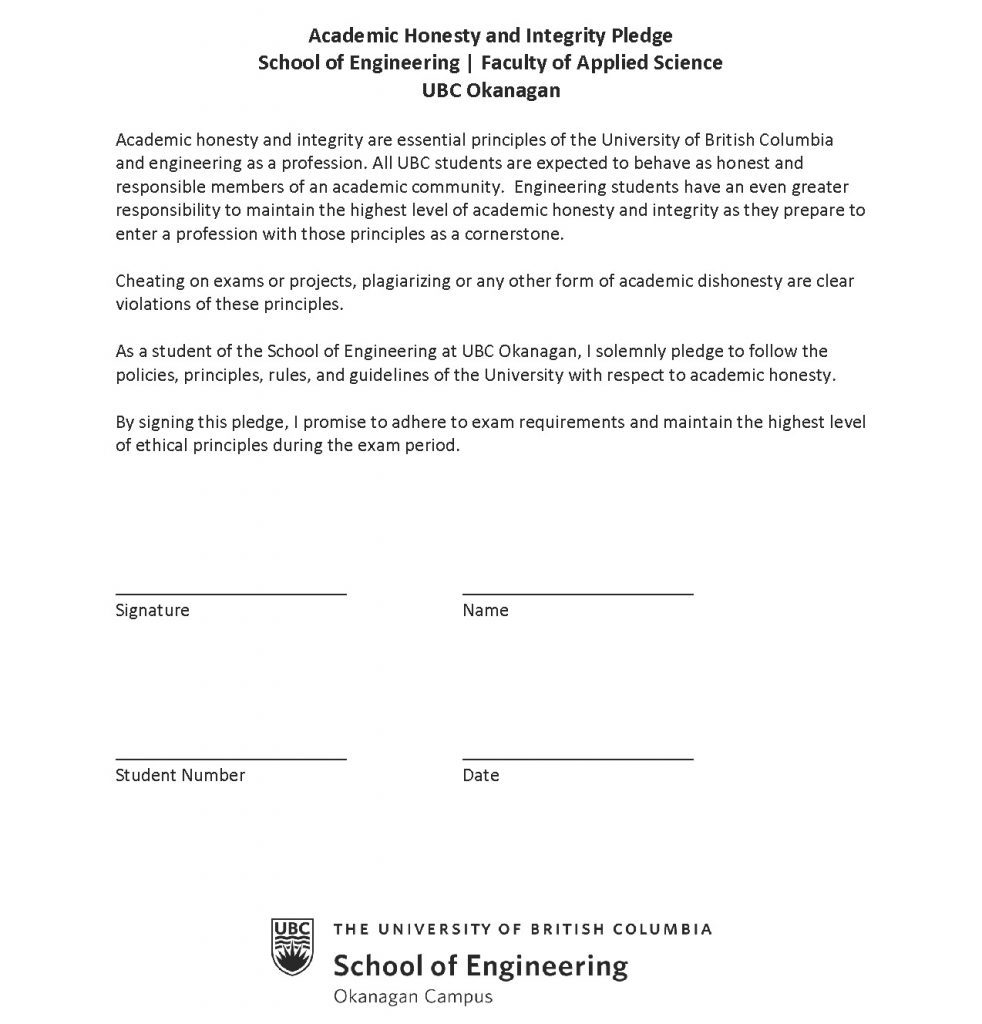With online learning and assessment taking place this year as a result of COVID-19 physical distancing measures, School of Engineering students are signing an integrity pledge prior to each exam. The pledge serves as a reminder of the importance of honesty and ethical principles that are a foundation of the field of engineering.

Why an integrity pledge? School of Engineering Technical Communications Senior Instructor Laura Patterson provides additional context:
The integrity pledge is a form of an honour code to ensure students acknowledge that the exam is intended to be a solo exercise testing your individual skills and not a group effort. In an exam situation, consulting with colleagues for answers on an exam intended to test individual abilities is not “collaborating,” it is cheating and academic misconduct under UBC policies. Even though we are in a situation in which faculty may not be able to enforce this or enact consequences all the time, if a student chooses to continue this behaviour when expressly asked not to, they need to be aware that they are making a clear choice to act unethically, which is not entirely without consequences. These consequences are to one’s identity.
There are many situations where no one is watching, or there are no immediate consequences, where professionals must choose to do either the ethical thing or the unethical thing. We do what we practice, and we become what we do. Research into ethics in engineering education found that those students who operate unethically during their education have a higher likelihood of operating unethically in their professional careers, because they have not exercised the skill of operating ethically in the easier and lower stakes setting of education. When these bad habits catch up with us, they can lead to lawsuits, public disgrace, and death. Examples of such cases in the media include the SNC Lavalin fraud case, cases of individual engineering university professors caught plagiarizing out of Waterloo and Regina, or the Hyatt Regency walkway collapse that killed 114 and injured 216. Few people wake up and decide to be unethical or think themselves to be, but the daily habit of cutting corners in the short term and rationalizing that behaviour builds to larger exceptions that become harder to resist.
The “if everyone is doing it, I should too” argument is a common logical fallacy known as the bandwagon argument used to rationalize behaviour because it is popular. The common retort is “if everyone jumped off of a bridge, should you too?” A better quotation to respond to this argument would be “The only thing necessary for the triumph of evil is for good men to do nothing.” It is true that it will seem that others are getting away with it; however, choosing to participate in it, not only makes the situation worse, it also comes at a significant cost to one’s perceptions of oneself.
This integrity pledge then becomes a question of “Who do you want to be?” Choosing to do the ethical thing, even when the other option seems easier, is a long-term choice to build the habits of ethical behaviour and the skill set of handling the hard things necessary to be an ethical professional. It can also influence other students to act with integrity and help shift the culture if more students expected their colleagues to act ethically. So, when you choose what you are going to do in these difficult situations, you are choosing your identity and influencing the culture of your educational program.
Dr. Laura Patterson
On behalf of the School of Engineering Ethics Committee